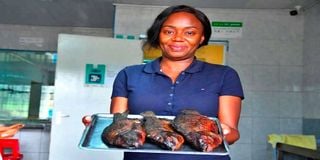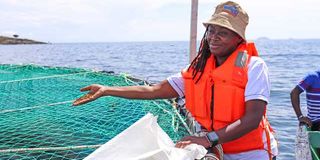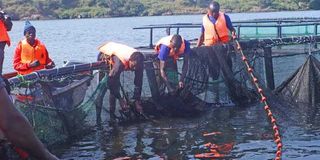Business tackling exploitative fishing systems with ethical aquaculture solutions

Rio Fish founder Angela Odero displays fried tilapia.
If you ask the people behind Rio Fish, who have invested in the aquaculture sector, the company is trying to reshape the future of fish farming in rural Kenya. They are doing this by producing high-quality fish products while driving social change.
Co-founded by Angela Odero, the company operates a tilapia cage farm, a modern processing plant, and sales outlets managed by women and youth, offering a range of fresh, dried and smoked fish products.
“Our journey began with a vision to save women from exploitative practices and has evolved into a thriving business that produces tilapia while nurturing local communities, empowering women and youth, and building a sustainable future for the aquaculture sector,” says Ms Odero.
The business was founded on a simple idea: to offer a sustainable and ethical alternative to the harmful practices of traditional fishing, particularly the exploitative “jaboya” system, which had left women at the mercy of unscrupulous middlemen and fishermen.
This practice placed undue economic pressure and sexual exploitation on women in fishing communities. This is what prompted the founders to set up their business, the aim of creating dignified livelihoods for these women.
“The goal was to create an aquaculture model that would provide high-quality fish while lifting local communities out of poverty, particularly those most vulnerable - women and youth,” she says.
The journey to realising this vision began in 2014 when the initial family-backed fish farm was established. This first step was modest, relying heavily on personal savings totalling Sh10 million.
Aquaculture business
However, as the company’s potential became clearer, Rio Fish was formally established as a separate entity in 2018, focusing exclusively on expanding the aquaculture business. From there, the company steadily grew, overcoming the many challenges common in a fledgling industry.
According to Ms Odero, the aquaculture industry in Kenya, particularly around Lake Victoria, is riddled with challenges. Unsustainable fishing practices, gender inequality, and limited market access for smallholder fish farmers were just some of the issues Rio Fish aimed to address.
It takes pride in being a leading employer, with women and youth making up most of its workforce, including key leadership positions, and providing a reliable, eco-friendly fish supply while economically empowering rural communities.

Angela Odero, the founder and CEO of Rio Fish, a fish processing farm in Homa Bay.
“We sought to provide dignified work and ensure that these groups had the resources and training they needed to succeed, and in doing so, we tackled a critical gap in the market—the lack of opportunities for women and youth to participate in and benefit from the fish value chain actively,” she notes.
As the global demand for sustainable food production grew, it became evident that responsible fish farming practices were key to ensuring both the longevity of aquatic ecosystems and the viability of the fish farming business. Thus, sustainability became at the heart of Rio Fish’s mission.
“The company is helping to bridge the gender gap in the aquaculture sector by providing training, financial independence, and leadership opportunities, offering women a sustainable path to economic independence and security,” she says.
Training programs enhance fish farming, business skills, and market access, boosting productivity and community development. The company employs environmentally friendly aquaculture techniques to ensure the health of aquatic ecosystems while producing high-quality tilapia.
These practices include responsible feed management, water quality monitoring, and waste reduction strategies that minimise the environmental footprint of the fish farming operations.
“We are committed to social sustainability, evident in our dedication to fair wages, gender equity, and the economic empowerment of rural communities,” she says, adding that these values form the bedrock of their operations and contribute to their long-term vision of creating a balanced, sustainable aquaculture business that benefits both people and the planet.
Not content with following industry standards, they constantly seek to introduce new and creative solutions to improve fish farming practices, enhance product offerings, and ensure that customers enjoy fresh, high-quality products.
“We offer a wide range of products, from fresh tilapia to dried and smoked fish, as well as innovative fish products designed to meet the evolving tastes and consumers preferences,” she says.
A major area of innovation is the use of technology to improve farm management, monitor fish growth, and connect consumers with their products. They have integrated aquaculture technology into their operations to monitor fish growth and optimise feeding practices.
Additionally, they launched the RIOFISH mobile app to connect consumers with fish farmers, making it easier to access fresh, locally grown fish. The app also supports smallholder farmers by providing valuable market information, production insights, and networking opportunities.
Currently, Rio Fish is constructing a central aggregation market in Kisumu, which will serve over 1 million consumers in the region. This market aims to create a scalable model that can be replicated across the Lake Victoria area.
The business is also at the forefront of sustainability, leveraging fish waste from processing to produce biogas that powers its operations, significantly reducing reliance on conventional energy sources.

Workers at Rio Fish Farm harvest fish from a cage at Rasira Beach in Suba South.
The company harnesses the abundant solar energy at its lakeside location, operating a 100 per cent solar-powered cage fish farm and investing in solar chilling solutions.
“Rio Fish has formed strategic partnerships with both local and national government agencies to advocate for environmental protection, strengthening these relationships through public-private dialogue,” says Ms Odero.
Challenges
Securing funding for Rio Fish’s operations has been a huge challenge, particularly as a women-led enterprise in a male-dominated industry. The company has faced gender bias in securing investments, as potential investors often overlook women-led businesses.
Moreover, the emerging nature of the aquaculture industry, combined with the company’s focus on innovation, was perceived as risky by traditional financiers.
However, through perseverance and a strong commitment to its mission, the business has overcome these hurdles.
“We strategically seek socially conscious investors who share our vision for economic growth and community empowerment. Partnerships with local commercial banks, NGOs, government agencies, and impact investors have helped to secure the necessary funding to grow the business.”
Beyond economic empowerment, Rio Fish plays a crucial role in enhancing food security in the region where it is based. Promoting sustainable fish farming, the company ensures a steady supply of nutritious fish for communities around Lake Victoria.
It also supports smallholder farmers by offering fair prices, reducing post-harvest losses and providing reliable markets. Additionally, the company trains farmers in waste reduction and resource efficiency.
Ms Odero notes that future plans include increasing the volume of fish produced, improving the technological capabilities of the mobile app, and exploring new markets locally and internationally.
“We aim to continue building strategic partnerships with stakeholders along the fish value chain, including smallholder farmers, processors, and distributors, to create a more efficient and resilient aquaculture sector,” she concludes.
mwmaina@ke.nationmedia.com


